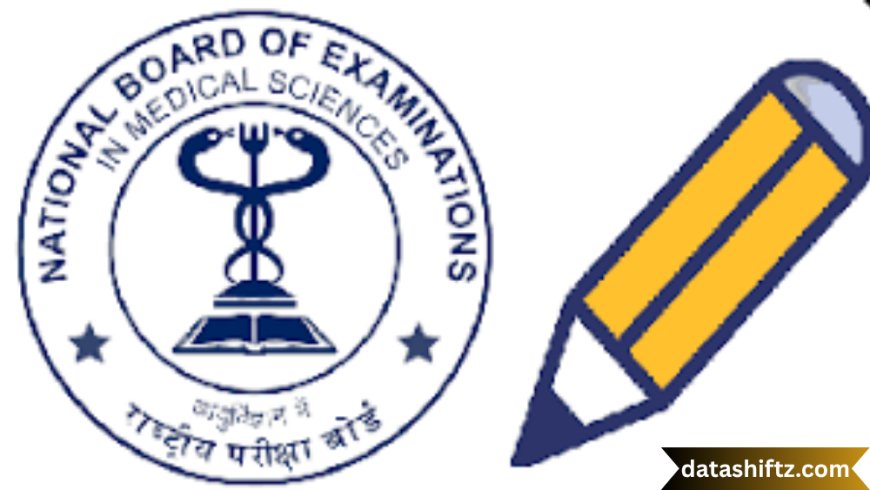NBEMS: The Backbone of Medical Education and Assessment in India

Introduction
The National Board of Examinations in Medical Sciences (NBEMS) plays a pivotal role in maintaining the quality, transparency, and standardization of postgraduate medical education in India. Established with the vision to create a consistent and high standard of medical examinations across the country, NBEMS is an autonomous body under the Ministry of Health and Family Welfare, Government of India. It is responsible for conducting a variety of postgraduate, postdoctoral, and fellowship-level examinations for aspiring medical professionals.
In a nation where access to quality healthcare is both a right and a necessity, institutions like NBEMS are crucial in ensuring that future healthcare providers are trained and evaluated with utmost rigor and fairness.
What is NBEMS?
Understanding the Structure and Role of NBEMS
NBEMS, formerly known as National Board of Examinations (NBE), was established in 1975. It underwent a name change to NBEMS in 2021 to reflect its broader scope beyond just examinations to medical education, regulation, and capacity building.
The primary mandate of NBEMS is to:
-
Conduct Postgraduate Medical Examinations
-
Accredit institutions for training in broad and super specialties
-
Certify and maintain quality assurance in examinations
NBEMS ensures that medical graduates are assessed objectively, professionally, and transparently—thus upholding the integrity of the Indian healthcare education system.
Functions and Responsibilities of NBEMS
Core Functions at a Glance
NBEMS conducts various examinations that are essential for medical specialization and licensing in India. These exams include:
Major Examinations Conducted by NBEMS
| Examination | Purpose | Eligibility | Frequency |
|---|---|---|---|
| NEET-PG | Entrance for MD/MS/PG Diploma | MBBS graduates with internship | Annually |
| NEET-SS | Entrance for DM/MCh super-specialty courses | MD/MS or equivalent degree holders | Annually |
| DNB Final Examinations | Certification for Diplomate of National Board qualifications | DNB trainees in respective specialties | Bi-annually |
| FMGE | Screening for foreign medical graduates | Indian citizens with foreign medical degrees | Bi-annually |
| FNB Exit Exams | Fellowship certification in specialized medical fields | FNB trainees | Annually |
| DNB-PDCET | Post Diploma Centralized Entrance Test | Diploma holders seeking DNB qualifications | Annually |
These examinations are recognized for their objectivity and have become an essential gateway for medical practitioners in India.
Accreditation and Training Programs
NBEMS also plays a vital role in accrediting hospitals and institutions for training doctors in DNB (Diplomate of National Board) and FNB (Fellowship of National Board) programs.
Key Accreditation Activities of NBEMS
-
✅ Evaluation of institutional infrastructure
-
✅ Approval of faculty and training standards
-
✅ Regular academic audits
-
✅ Maintenance of training logbooks and academic activity records
-
✅ Conducting online and offline inspections
This accreditation process ensures that even non-medical college hospitals, including private and public sector hospitals, can train specialists.
NBEMS vs Traditional Medical Colleges
A common point of debate in the medical community is the perceived difference between DNB and MD/MS degrees. However, the NBEMS qualification is now widely accepted and considered equivalent to university-based degrees, especially after the amendments made by the National Medical Commission (NMC).
Comparison Between DNB and MD/MS
| Parameter | DNB (NBEMS) | MD/MS (University) |
|---|---|---|
| Recognizing Body | NBEMS | National Medical Commission (via Universities) |
| Training Centers | Hospitals (Govt. and Private) | Medical Colleges |
| Entrance Exam | NEET-PG or DNB-PDCET | NEET-PG |
| Degree Recognition | Equivalent (as per NMC regulations) | Fully recognized |
| Job Opportunities | Government and private sectors | Government and private sectors |
Technological Integration and Reforms
NBEMS has adopted several modern technological solutions to streamline its functioning:
Digital Reforms by NBEMS
-
???? Computer-Based Testing (CBT) for NEET and FMGE
-
???? Teleproctoring and digital evaluation of answer scripts
-
???? NBEMS Mobile App for result alerts, hall tickets, and notifications
-
???? AI-assisted question moderation and evaluation tools
-
????️ Online application and verification systems
These initiatives ensure transparency, reduce human error, and make the process more efficient for thousands of applicants across India.
Challenges Faced by NBEMS
Despite its significant contributions, NBEMS has faced certain challenges:
-
❗ Perception issues around DNB equivalence with MD/MS
-
❗ Language barriers in exams, especially for FMGE candidates
-
❗ Limited training infrastructure in rural or non-metro regions
-
❗ Pressure to maintain exam quality amidst increasing volumes
Efforts are being made to address these concerns through policy reforms, awareness campaigns, and increased investment in training infrastructure.
NBEMS and the Future of Indian Medical Education
The Indian healthcare landscape is evolving rapidly. With the introduction of National Medical Commission (NMC) and reforms like the National Exit Test (NEXT), NBEMS is expected to play a greater role in streamlining education and licensing standards.
What Lies Ahead?
-
????⚕️ NEXT may replace NEET-PG and FMGE under a unified system
-
???? Greater focus on public-private partnerships for training
-
???? International collaboration for global equivalency of DNB degrees
-
???? Expansion into new super-specialty and fellowship programs
-
???? Outcome-based assessments to promote skill-based training
NBEMS will be central to ensuring quality and access in this rapidly changing environment.
Conclusion
The National Board of Examinations in Medical Sciences (NBEMS) is a cornerstone of postgraduate and super-specialty medical education in India. Through its fair, transparent, and tech-enabled examination system, NBEMS ensures that only the most competent candidates earn their qualifications, thereby safeguarding the quality of healthcare in the country.
With continuous modernization, robust evaluation systems, and a clear mission, NBEMS is not just conducting exams—it is building the future of India’s healthcare system, one doctor at a time.
Would you like this article in a downloadable PDF format, or should I assist you in summarizing it for social media or academic use?





























